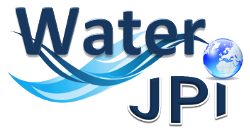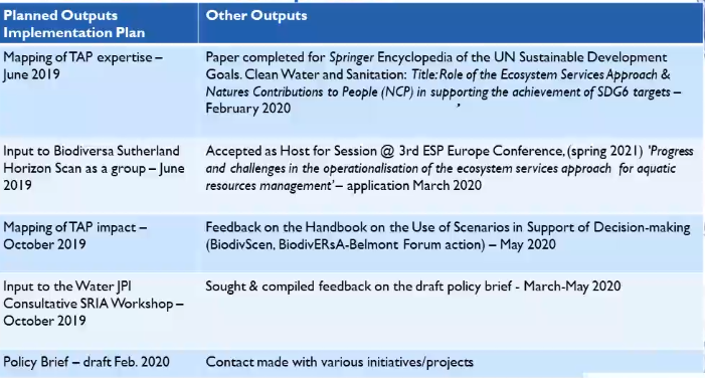Newsletter July 2020
Collaborations:
Osman Tikansak – FORMAS – Sweden
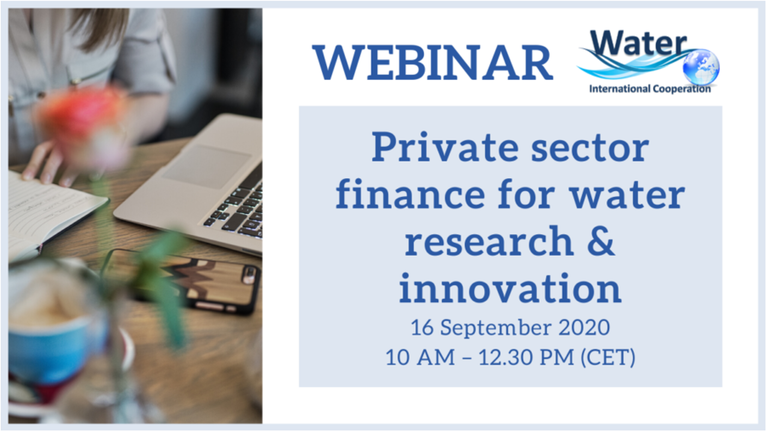
Water JPI Webinar on private sector finance for water research & innovation
The huge challenges the water sector faces on a global scale will require new innovative ways of financing and organizing research and innovation.
Water JPI and Water Europe have joined forces to organise a webinar where the different best practices and financial models geared to the water sector will be discussed and your input will be much appreciated for developing future water policies.
...
Water JPI and Water Europe have joined forces to organise a webinar where the different best practices and financial models geared to the water sector will be discussed and your input will be much appreciated for developing future water policies.
This webinar will focus on three main topics:
- Best practices on financing research and innovation.
- The role of industry and water companies promoting innovative solutions.
- The role of financial institutions on promoting innovative solutions.
Why should you attend?
Participants will gain a better understanding of this topic in order to be more successful in design and implementation of new funding programmes in collaboration with private sector parties. The webinar is intended for public and private (research) funding organisations, research organisations and industry (in particular the ones that have experience in collaboration outside Europe) and policy makers.
For registration click here, or check for more information the website of Water Europe.
For detailed programme, click here.
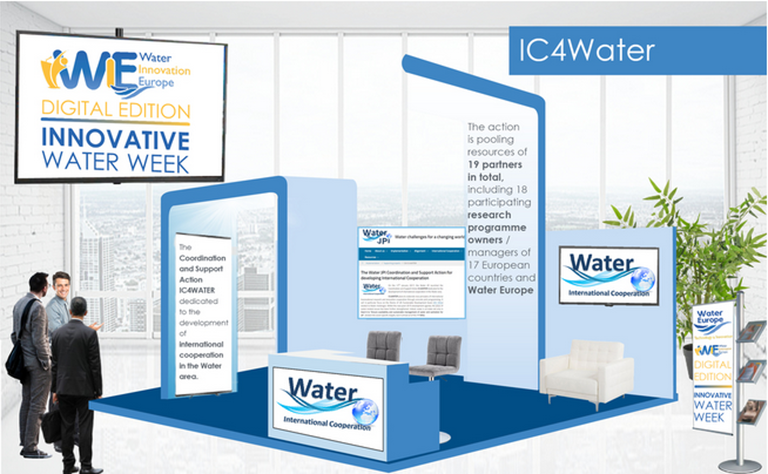
IC4Water at the International Water Dialogue Virtual Event
Water Europe organised digitally this year’s edition of the Innovative Water week entitled ‘A Water-Smart Society for a Post-COVID19 Green Deal’, was held entirely virtually from the 22nd to the 26th of June 2020.
Pollution and viruses do not stop ...
Water Europe organised digitally this year’s edition of the Innovative Water week entitled ‘A Water-Smart Society for a Post-COVID19 Green Deal’, was held entirely virtually from the 22nd to the 26th of June 2020.
Pollution and viruses do not stop at our boundaries and are not an issue of a single sector only. Over 400 registered participants attended sessions, meetings, and webinars.
Dominique Darmendrail (Water JPI Coordinator at ANR) represented the IC4Water consortium to hold a virtual booth, which was opportunities to have B2B meetings with Water Europe members including SMEs.
She also attended some Working Group sessions for presenting Water JPI activities and outputs, in particular on International Cooperation and Contaminants of Emerging Concern.
Some contacts are now invited to the Water JPI and Water Europe Webinar on Private sector finance for water research & innovation that takes place virtually on September 16 (10 am – 12.30 am CET)
Post-event key messages available at: https://watereurope.eu/water-innovation-europe-2020-post-conference-key-messages/?utm_source=rss&utm_medium=rss&utm_campaign=water-innovation-europe-2020-post-conference-key-messages
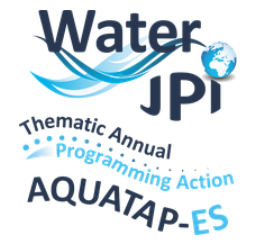
AquaTAP_ES - Workshop 3
The third AQUATAP_ES workshop was originally due to take place in Madrid, but due to the global COVID-19 pandemic, this was changed to a half day virtual workshop on June 16th, 2020, addressing Aquatic Ecosystems Services Data and Modelling needs. ...
The third AQUATAP_ES workshop was originally due to take place in Madrid, but due to the global COVID-19 pandemic, this was changed to a half day virtual workshop on June 16th, 2020, addressing Aquatic Ecosystems Services Data and Modelling needs. It was attended by 19 people including representatives from the six TAP projects from seven different countries. The workshop was hosted by the Irish Environmental Protection Agency (EPA).
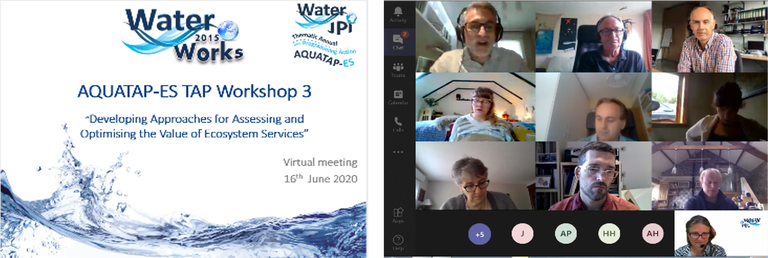
The main purpose of this workshop was to initiate work on the medium-term goals, in respect to Data and Modelling needs. The group used collective knowledge to identify potential data needs. Those needs will very much depend on how ecosystem services are being considered and the questions that the stakeholders are asking/information that they are seeking. The data needs will also influence the modelling and in turn the DSS. This 3rd workshop now demonstrates increased outputs achieved by the network as they progress work together and further develop their activities in the AQUATAP-ES implementation plan.
As follow on from the workshop a short survey / questionnaire on Aquatic Ecosystem Data needs and Gaps has been circulated and adverted to interested stakeholders who work in the area of Ecosystem Services. If you wish you think your work is relevant please fill in the survey here.
Miguel Ángel Gilarranz Redondo, Water JPI Vice Chair officially handed over the AQUATAP_ES Scientific Coordinator role from Mary Kelly Quinn to José María Bodoque del Pozo. Miguel on behalf of the group thanked Mary for her tireless effort and work in getting the network up and running and ensuring major achievements in such a short timeframe. He congratulated Jose, on stepping into the role and wished him well and continued success for the next 12 months. Further acknowledgment to Mary were voiced by Dominique Darmendrail (Water JPI Coordinator) and best wishes to Jose.
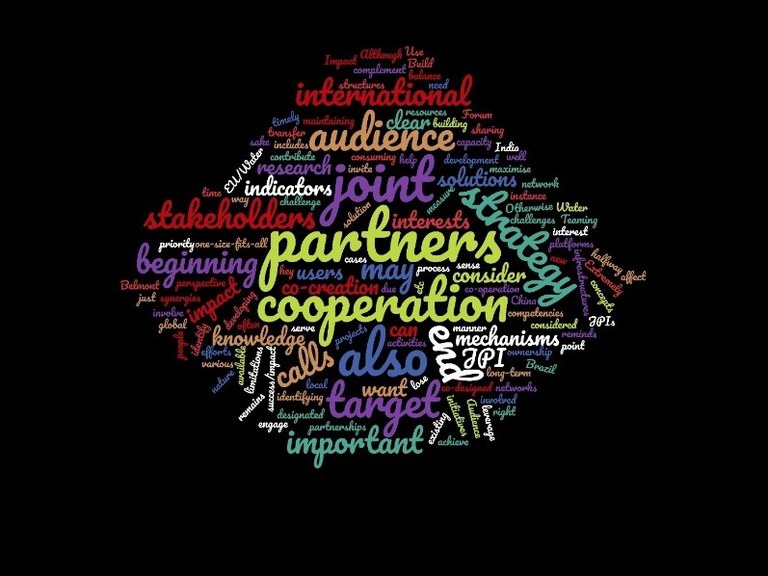
Workshop 3 IC4 Water Towards a Common Strategy on International Cooperation 2020
Water Joint Programming Initiative Workshop on “Towards a Common Strategy on International Cooperation”, took place on the 26th May 2020 as a virtual workshop.
There were 45 attendees for this online workshop, from 25 countries. The attendees represented: 19 initiatives/networks. The workshop was hosted by the Irish Environmental Protection Agency (EPA), and was the third workshop in a series of three ...
There were 45 attendees for this online workshop, from 25 countries. The attendees represented: 19 initiatives/networks. The workshop was hosted by the Irish Environmental Protection Agency (EPA), and was the third workshop in a series of three workshops targeted peer-EU initiatives, designed to elaborate a strategy with other relevant EU and international initiatives on international cooperation in the context of research, development and innovation activities. The opening introduction given by Dominique Darmendrail (ANR), Water JPI Coordinator and followed by two keynote presentations from Panos Balabanis (EC DG Research) on the proposed Water4All Partnership and Effie Amanatidou (ERALearn) on Impact Assessment. Examples of International Cooperation Strategies were provided by the JPI Ocean and the JPI Urban Europe. Finally, the BELMONT forum, Canada and South Africa covered possible opportunities for collaboration with the Water JPI. Three afternoon breakout sessions took place, key questions were discussed:
- Target Audience of the Strategy
- Aims of the Strategy
- Structure of the proposed Common Strategy &
- Proposed Objectives.
More information is available from the Water JPI website.
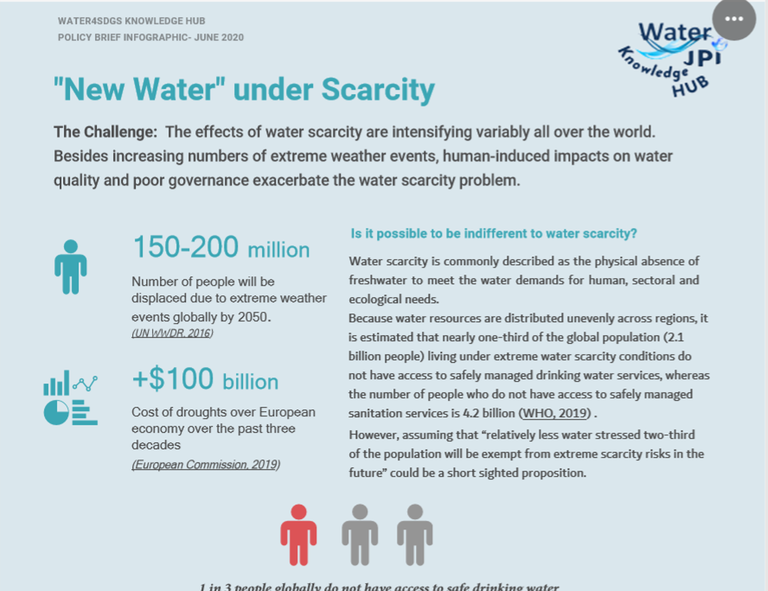
Water4SDGs first line of output activities under the IC4WATER CSA
Knowledge Hub’s policy brief “New Water under Scarcity: Integrated Solutions to Accomplish Water Related UN SDGs” is available online
The 2nd Water JPI Knowledge Hub, Water4SDGs has published a new policy brief, which is covering summaries of 11 state-of-the-art research projects coordinated by the Knowledge Hub experts and 5 key messages that can help decision makers (ministries, ...
The 2nd Water JPI Knowledge Hub, Water4SDGs has published a new policy brief, which is covering summaries of 11 state-of-the-art research projects coordinated by the Knowledge Hub experts and 5 key messages that can help decision makers (ministries, municipalities, basin managers, water operators, urban planners, irrigation associations, etc) to make informed decisions for the design and implementation of sustainable water management policies. The Policy Brief calls for action to address water scarcity challenge by applying “new water” solutions. Here, “new water concepts” refer to a range of solutions for improving water efficiency capacity; including reuse, recycling, treatment, water saving, stormwater management, rainwater harvesting, as well as tools for good governance. The key messages of the Policy Brief are summarized as follows:
- Understand interactions, challenges, trade-offs and opportunities around UN SDGs and water scarcity through stakeholder mapping and engagement.
- Leave no one behind without access to water, sanitation and hygiene (WASH) services by any means possible, including cost-efficient solutions at local or household level.
- Give priority to equitable, resource-efficient, demand management solutions to decouple water use from economic growth.
- Implement climate-smart applications with multiple benefits to mitigate the effects of climate change.
- Monitor the progress and uptake the best-practices with Living Lab applications that allow for user centred research and innovation processes with public-private-people partnerships.
Download the full document and infographic that summarizes the policy brief.
Public Consultation for Contribution to AQUATAP-ES
In the framework of the Water JPI Thematic Annual Programming action (TAP) focussed on ecosystem services, the members of AQUATAP-ES launched a public consultation on Aquatic Ecosystem Services Data.
AQUATAP-ES comprises researchers on 6 projects ...
In the framework of the Water JPI Thematic Annual Programming action (TAP) focussed on ecosystem services, the members of AQUATAP-ES launched a public consultation on Aquatic Ecosystem Services Data.
AQUATAP-ES comprises researchers on 6 projects in 4 countries (Ireland, Spain, The Netherlands & Finland) covering both freshwater and marine disciplines. Details of the various partners and projects are available here.
The overall goal of AQUATAP-ES is Informing Policy & Practice. Although the concept of ecosystem services has been the focus of a considerable body of research for more than a decade, there is little evidence that this science has become streamlined within policy or practice, or used in decisions to protect water quality, and biodiversity, or restore natural capital and use it sustainably. Thus, the TAP is addressing what is needed to foster integration of the ecosystem service concept into decision-making relating to the management of aquatic resources.
The identification of key stakeholders and their needs in terms of information, tools and other supports (e.g. numerical models and decision support tools and training) are considered in order to identify synergies with others working in this area and opportunities for collaboration and exchange of ideas.
A very short questionnaire on Aquatic Ecosystem Services Data (only 5 key questions) is accessible until July 17th for contribution from stakeholders, researchers, networks specialising in the characterisation and valuation of ecosystem services:
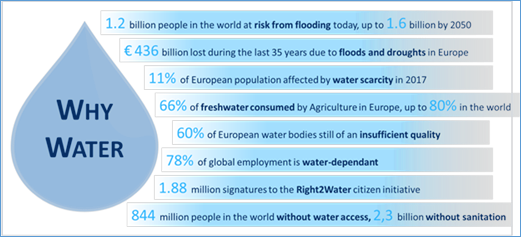
Water4All Partnership Candidate for Horizon Europe – Launch of partners consultation
Water4All is one of the eight European Partnerships proposed under Cluster 6 «Food, Bioeconomy, Natural Resources, Agriculture and Environment» of Horizon Europe, the future Research and Innovation Framework Programme. The European Commission has ...
Water4All is one of the eight European Partnerships proposed under Cluster 6 «Food, Bioeconomy, Natural Resources, Agriculture and Environment» of Horizon Europe, the future Research and Innovation Framework Programme. The European Commission has published the detailed document presenting the Partnership candidate following an ex-ante evaluation of the criteria for establishing a Horizon Europe Partnership.
Two partnership workshops took place in May 2020: a workshop with NCP on 22/05/2020 and another workshop with other partnerships on 28/05/2020.
In order to progress on the preparation of the following step, the Water4All Drafting Group has initiated discussions with Member States, National Contact Points and close Partnership candidates under development. It has launched a consultation of the possible partners for further develop the Partnership candidate.
Next important Milestone for all Partnership candidates and Water4All: the commitments of Member States and corresponding actors by end of September 2020 for all Partnerships planned for 2021 – 2022 Work Programmes of Horizon Europe. To read more, please click here.
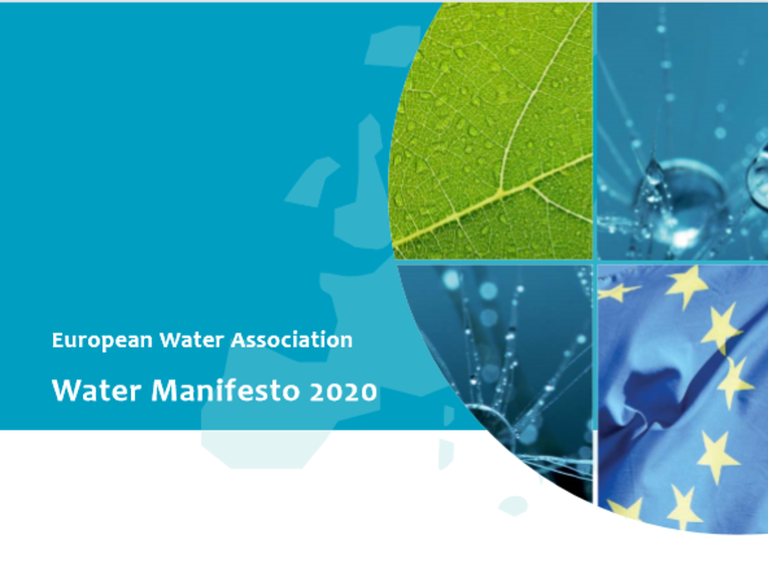
The European Water Association calls for action in its new Water Manifesto
With its new Water Manifesto, the European Water Association (EWA) draws attention to current challenges for water management in Europe and makes proposals for sustainable solutions to these. EWA calls upon civil society and all relevant ...
With its new Water Manifesto, the European Water Association (EWA) draws attention to current challenges for water management in Europe and makes proposals for sustainable solutions to these. EWA calls upon civil society and all relevant stakeholders to contribute to implementation of such solutions, and EWA encourages the permanent dialogue between the decision makers and the national and regional authorities.
Responsible for the development of the EWA Water Manifesto 2020 is the EWA European Policy Committee, which has experts from numerous European countries. Chair of the EWA European Policy Committee is Wendy Francken from VLARIO in Belgium, who in this short video presents the new Water Manifesto:
➤ Video (duration 2:41 min.) with short presentation of the EWA Water Manifesto 2020.
The EWA Water Manifesto 2020 concentrates on the following four themes:
➀ Nature-based Solutions to Respond to Climate Change
➁ Financing Investment in Water Services
➂ Asset Management and Digitalisation of Water Infrastructure
➃ Boosting Water Demand Management
➤ Download: You find the new EWA Water Manifesto here.
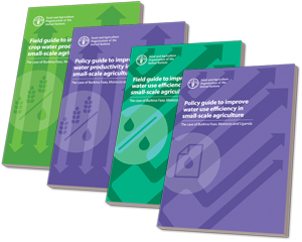
New series of FAO Policy and Field Guides to improve water productivity and water use efficiency in small-scale agriculture
Enhancing the productivity and efficiency of agricultural water is key to increase food production and respond to the growing food demand, while at the same time preserving healthy and sustainable ecosystems. Even more so in drought- and desertification-prone areas, whereby agricultural production is negatively affected by climate change, erratic rainfall patterns and increasing water scarcity.
The improvement of agricultural water management, however, can only be achieved through synergetic plans of action and effective choices by all stakeholders. National policy strategies and improved farming practices are both essential to overcome ...
The improvement of agricultural water management, however, can only be achieved through synergetic plans of action and effective choices by all stakeholders. National policy strategies and improved farming practices are both essential to overcome challenges posed by drought and desertification and to change public attitudes in order to “produce more with less”.
A series of four publications has been produced in the framework of the “Strengthening agricultural water efficiency and productivity at the African and global level” project, to present results and lessons learned from the application of comprehensive approaches and real-term implementation of water productivity and water use efficiency practices in Burkina Faso, Morocco and Uganda.
Taking into account the need to address all relevant stakeholders, a series of publications that includes two field guides for farmers and practitioners, as well as two policy guides for institutional actors and decision makers were developed.
Read the publications:
- Field guide to improve crop water productivity in small-scale agriculture
- Field guide to improve water use efficiency in small-scale agriculture
- Policy guide to improve water productivity in small-scale agriculture
- Policy guide to improve water use efficiency in small-scale agriculture
Visit he Food and Agriculture Organization (FAO) of the United Nations website
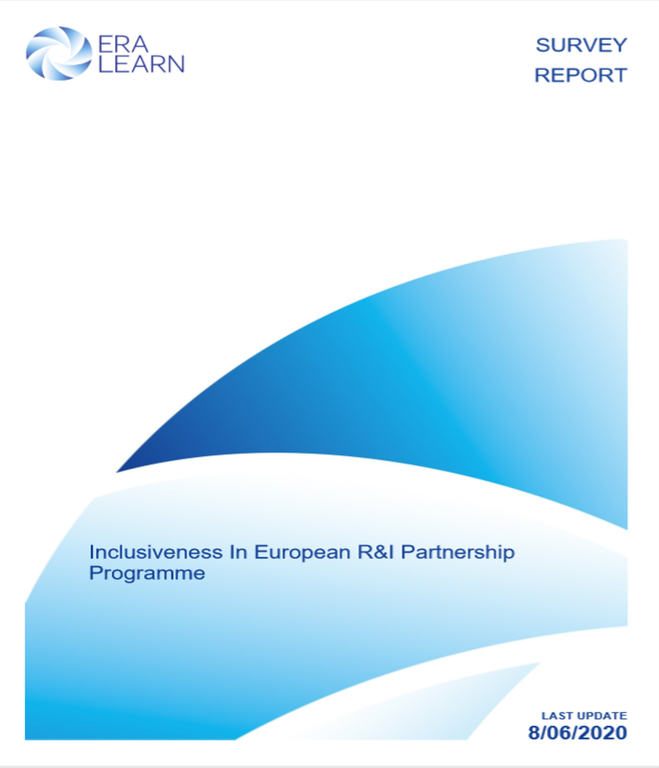
Inclusiveness in European R&I Partnership Programme
ERA-LEARN has published a new Report on Inclusiveness in European R&I Partnership Programme.
The report presents the results of an ERA-LEARN survey on inclusiveness targeted at H2020 ERA-NET Cofund and EJP Cofund Programme coordinators. The goal ...
ERA-LEARN has published a new Report on Inclusiveness in European R&I Partnership Programme.
The report presents the results of an ERA-LEARN survey on inclusiveness targeted at H2020 ERA-NET Cofund and EJP Cofund Programme coordinators. The goal of the survey was to collect information on measures introduced by H2020 ERA-NET Cofund and EJP Cofund Programmes, in order to enhance the participation of the ‘Widening Countries’.
To sum up, the survey results demonstrate that participation of Widening Countries in EU Partnerships is limited and actions are needed to strengthen it. However, only by introducing a systematic portfolio of Widening measures throughout the entire Programme cycle can we obtain the expected outcome, namely a larger number of funded projects including organisations from Widening Countries.
You can download the Report on Inclusiveness in European R&I Partnership Programme here
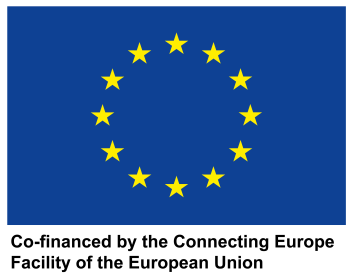
Water Health Open knoWledg - WHOW Project
In the framework of the Connecting Europe Facility (CEF) TELECOM in September 2020 the WHOW project will be launched. The project has aims to develop a framework to foster the creation of a large data ecosystem on water consumption and quality, ...
In the framework of the Connecting Europe Facility (CEF) TELECOM in September 2020 the WHOW project will be launched. The project has aims to develop a framework to foster the creation of a large data ecosystem on water consumption and quality, health parameters, and dissemination of diseases to be reused for advanced analysis and development of innovative services. WHOW addresses the generation of cross-border and cross-domain services also re-using information made discoverable through the European Data Portal. In particular, the project will develop the first European knowledge graph on water consumption and pollution, with data sources coming from different administrative levels; and will correlate this environmental data to health data on disease dissemination by integrating datasets of Italy and other EU countries, making them available for anyone for successive reuse. While the cross-border use case will focus on water-related datasets, the cross-domain use case will be implemented by the Italian partners correlating health data to environmental data. WHOW will target use cases in the creation of the knowledge graph, identifying and integrating the relevant set of indicators for Sustainable Development Goals (SDG), and will embrace a co-creation program where interested stakeholders and users will be engaged from the initial phases of the project. The Celeris Advisory Ltd (Irland) is leader of the project and the Italian Institute for Environmental Protection and Research (ISPRA), the Italian National Research Council – Institute of cognitive sciences and technologies (CNR-ISTC) and the ARIA S.p.A. (Regional company for Innovation and Purchases of the Lombardia Region) are the partners.
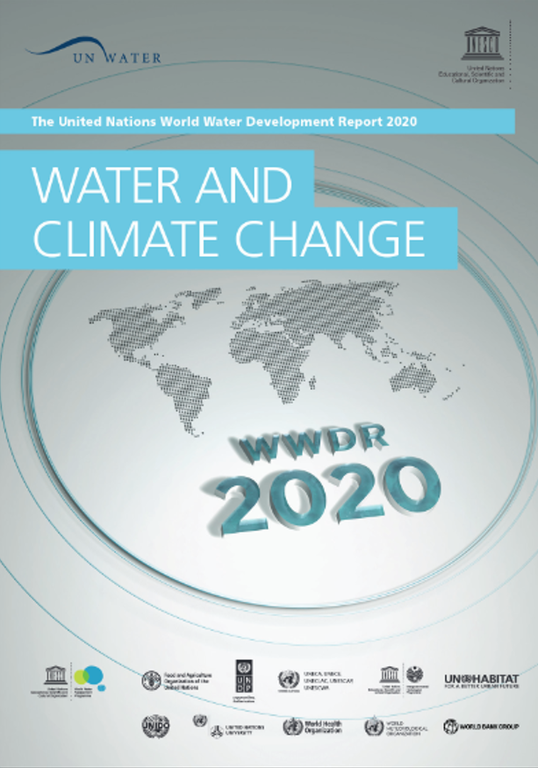
United Nations World Water Development Report
The 2020 edition of the World Water Development Report (WWDR 2020) entitled ‘Water and Climate Change’ aims at helping the water community to tackle the challenges of climate change and informing the climate change community about the opportunities ...
The 2020 edition of the World Water Development Report (WWDR 2020) entitled ‘Water and Climate Change’ aims at helping the water community to tackle the challenges of climate change and informing the climate change community about the opportunities that improved water management offers in terms of adaptation and mitigation.
The 2020 United Nations World Water Development Report focuses on the challenges, opportunities and potential responses to climate change, in terms of adaptation, mitigation and improved resilience that can be addressed through improving water management.
Combining climate change adaptation and mitigation, through water, is a win-win proposal, improving the provision of water supply and sanitation services and combating both the causes and impacts of climate change, including disaster risk reduction.

H2020. Marie Skłodowska-Curie Co-funding
The COFUND scheme aims to stimulate regional, national or international programmes to foster excellence in researchers' training, mobility and career development, spreading the best practices of the Marie Skłodowska-Curie actions.
This will be ...
The COFUND scheme aims to stimulate regional, national or international programmes to foster excellence in researchers' training, mobility and career development, spreading the best practices of the Marie Skłodowska-Curie actions.
This will be achieved by co-funding new or existing regional, national, and international programmes to open up to, and provide for, international, intersectoral and interdisciplinary research training, as well as transnational and cross-sectoral mobility of researchers at all stages of their career.
The deadline of the present call is 29 september.
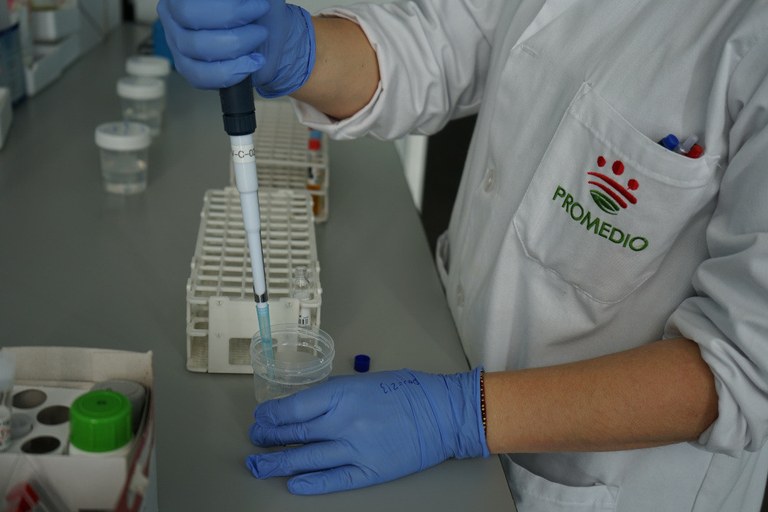
Public water operators as actors of public health: efforts in tracing SARS-CoV-2 in waste water
Members of Aqua Publica Europea are taking part in research efforts throughout Europe to detect and trace SARS-CoV-2 in waste water, as a potential tool for an early warning system and public health decision-making.
- EMASESA (Seville, Spain) ...
Members of Aqua Publica Europea are taking part in research efforts throughout Europe to detect and trace SARS-CoV-2 in waste water, as a potential tool for an early warning system and public health decision-making.
- EMASESA (Seville, Spain) is defining processes and network sectorisation to localise information and defining an action protocol as part of waste water safety planning.
- Eau de Paris(Paris, France) participated in a quantitative research conducted through the lockdown period that found a parallel between the quantity of virus RNA in waste water and the evolution of clinical cases.
- PROMEDIO(Badajoz, Spain) is adapting tools designed for larger cities to its own on-the-ground reality: smaller municipalities, rural areas, disperse populations.
- BCASA (Barcelona, Spain), is participating in EU-funded research projects that are incorporating activities related to COVID-19
- Many Italian operators are involved with the National Health Institute’s nationwide project
- Scottish Water, Budapest WaterWorks, Irish Water, Aguas de Cádiz, HAMBURG WASSER, and others collect and provide samples to support wider research initiatives.
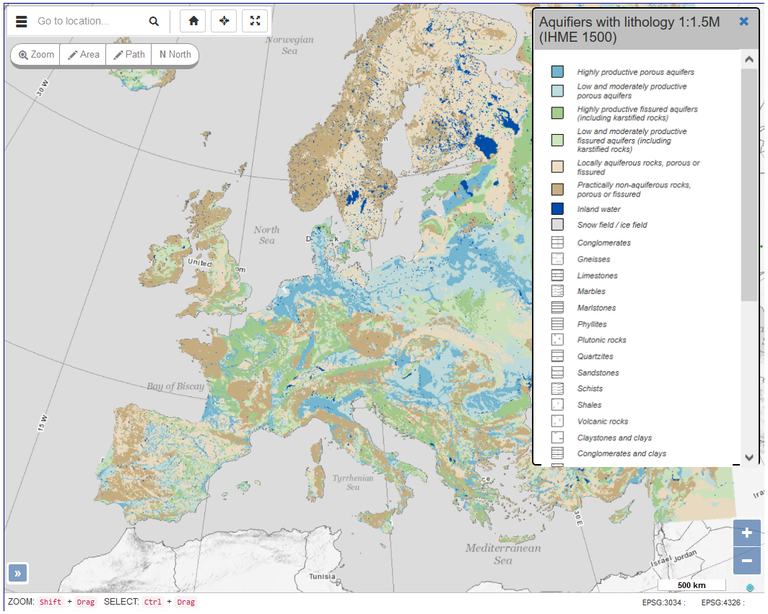
Vulnerability of Shallow Groundwater Resources to Deep Subsurface Energy-Related Activities (VOGERA)
Vulnerability of shallow groundwater resources to deep sub-surface energy-related activities (VoGERA) will gather scientific evidence to investigate the relationship between industrial activity in the deep sub-surface and shallow groundwater ...
Vulnerability of shallow groundwater resources to deep sub-surface energy-related activities (VoGERA) will gather scientific evidence to investigate the relationship between industrial activity in the deep sub-surface and shallow groundwater resources, in a European context. The project will consider the possible impacts on groundwater from a range of sub-surface energy activities (geothermal energy, unconventional oil and gas exploitation, sub-surface storage and disposal of wastes) in a consistent manner. An approach to evaluating groundwater vulnerability from sub-surface activities that can be applied across Europe will be developed using this evidence, and the in-depth understanding gained will be used to improve awareness of these issues with decision makers and the public. This will aid better sub-surface spatial planning and policy development for deep sub-surface energy-related activities in relation to groundwater, thus allowing for the simultaneous protection of groundwater for future generations whilst recognizing the need for economic development. A strong link with stakeholders will ensure an approach that is fit-for-purpose and has maximum impact. Conceptual models of shallow groundwater vulnerability to deep sub-surface energy activities will be developed using existing data and information and experience of GeoERA partners and from previous projects, and will be validated at a number of pilot study sites. These will be in different hydrogeological settings across Europe and will use a range of physical, chemical, isotopic and intercalibrated geophysical methods to identify and characterize contaminant pathway properties and their influence on groundwater vulnerability.
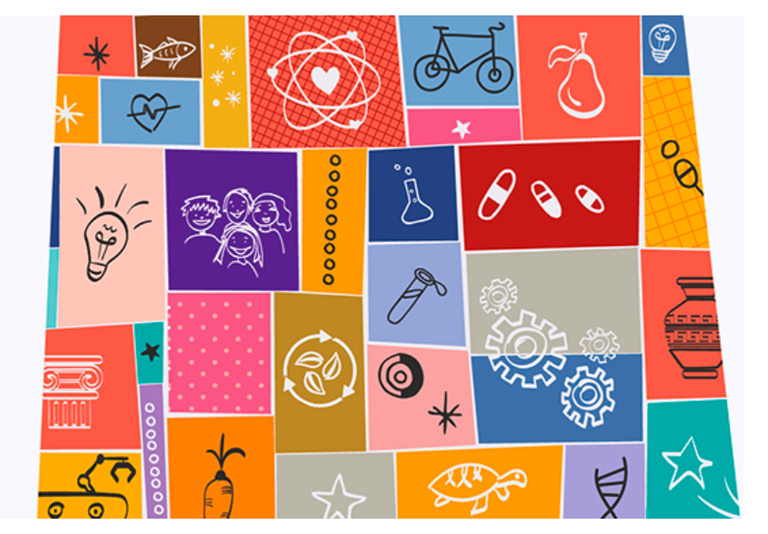
European Research and Innovation Days 2020
European Research and Innovation Days is the European Commission’s annual flagship event, bringing together policymakers, researchers, entrepreneurs and citizens to debate and shape the future of research and innovation in Europe and beyond.
With ...
European Research and Innovation Days is the European Commission’s annual flagship event, bringing together policymakers, researchers, entrepreneurs and citizens to debate and shape the future of research and innovation in Europe and beyond.
With our societies gradually lifting their lockdowns and recovery plans taking shape, we must now ensure that the transition to a post-corona society is sustainable, inclusive and resilient.
Research and innovation will be key to achieve this. This year's format will provide an opportunity to connect, take stock of research and innovation achievements in the global response to the pandemic and build on the EU’s response: worldwide coordination of excellent science for global health, social and economic recovery.
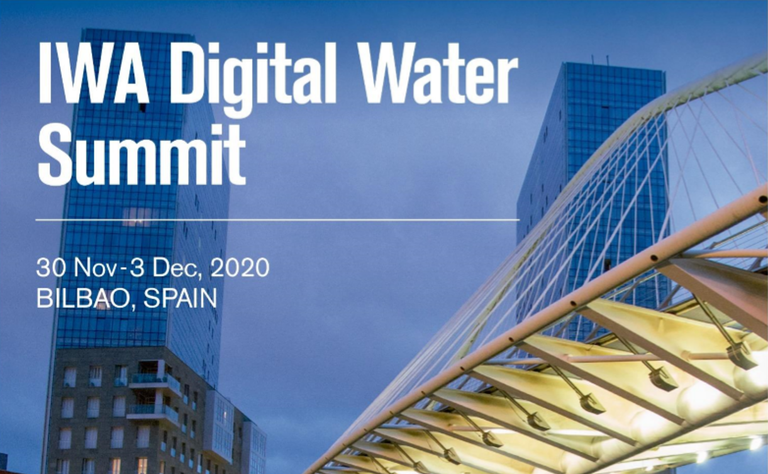
IWA Digital Water Summit
The IWA Digital Water Summit is designed to be the reference in digitalisation for the global water sector. Targeting all stakeholders involved in the water sector digitalisation, the Summit has a focus on business and industry. Water technology ...
The IWA Digital Water Summit is designed to be the reference in digitalisation for the global water sector. Targeting all stakeholders involved in the water sector digitalisation, the Summit has a focus on business and industry. Water technology providers and water utilities are the main participants that will discuss and shape the agenda of this first edition.
Co-organized by the water utility in the region (Consorcio de Aguas Bilbao Bizkaia) and the IWA Governing Member in Spain (AEAS). The IWA Digital Water Summit will be held in Bilbao, Spain.
To register, click here.
